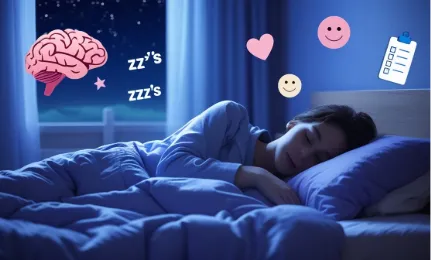
Sleep’s Role in Mental Health: Tips for Restful Nights
The Role of Sleep in Maintaining Mental Health: Tips for Better Sleep
Sleep is more than just rest—it’s a fundamental pillar of mental well-being. Quality sleep improves mood, sharpens cognitive function, and enhances emotional resilience. In this article, we’ll explore how sleep affects mental health, personal growth, and daily organization, and share practical tips to help you sleep better.
Why Sleep is Crucial for Mental Health
1. Emotional Well-being
Sleep is essential for emotional regulation. According to the Journal of Psychiatric Research, poor sleep increases the risk of anxiety and depression. Here’s how sleep supports emotional health:
- Mood Regulation – Sleep balances neurotransmitters like serotonin and dopamine.
- Stress Relief – Quality rest lowers cortisol, the stress hormone.
- Emotional Resilience – A rested brain copes better with life’s challenges.
🧠 Consistent, restful sleep improves your ability to manage emotions and bounce back from adversity.
2. Personal Growth and Development
Good sleep powers your mind to grow, learn, and evolve. Personal development literature and psychotherapy research show sleep enhances:
- Cognitive Function – Memory consolidation and problem-solving improve with rest.
- Creativity – REM sleep is directly linked to creative thinking.
- Decision-Making – A clear, rested mind makes better, more rational choices.
🌱 Personal growth starts with mental clarity—and that begins with sleep.
3. Organizational Skills and Productivity
Sleep sharpens your ability to plan, prioritize, and stay organized. Studies confirm that well-rested individuals:
- Focus Better – Attention span and concentration improve.
- Manage Time Effectively – Sleep supports structured thinking and scheduling.
- Make Fewer Mistakes – Reduced fatigue leads to increased accuracy.
📋 Productivity starts the night before—prioritize sleep to perform better each day.
Practical Tips for Better Sleep
Improving your sleep doesn’t have to be complicated. These evidence-based tips will help you build healthy sleep habits:
1. Build a Consistent Sleep Routine
- Same Time Daily – Go to bed and wake up at the same time, even on weekends.
- Wind-Down Rituals – Include calming activities like reading, meditation, or journaling.
2. Create a Sleep-Friendly Environment
- Comfort is Key – Invest in a supportive mattress and pillows.
- Control Light & Noise – Use blackout curtains or white noise to minimize disturbances.
- Set the Right Temperature – Keep your bedroom cool (60–67°F / 15–19°C).
3. Watch Your Diet and Activity
- Limit Caffeine & Alcohol – Avoid both several hours before bedtime.
- Eat Light in the Evening – Heavy meals can disrupt sleep.
- Exercise Smartly – Stay active, but finish workouts at least 2–3 hours before sleep.
🛌 Your daily habits have a direct impact on your nightly rest.
Tech Tools That Improve Sleep
In today’s digital age, technology can help you develop better sleep hygiene:
1. Sleep Tracking Apps
- Monitor Sleep Cycles – Track your patterns and get insights into what affects your rest.
- Set Goals – Set bedtime alerts and track progress toward your sleep targets.
2. Relaxation and Meditation Tools
- Guided Meditations – Apps like Calm and Headspace offer bedtime-specific sessions.
- Soothing Sounds – Nature sounds, white noise, or soft music help quiet the mind.
🔔 Use tech to build a nightly ritual that promotes calmness and deep rest.
Final Thoughts
Sleep isn’t just rest—it’s recovery for your mind. Better sleep can improve your emotional well-being, support personal development, and help you stay organized and productive. By creating healthy sleep habits, you’re taking a powerful step toward mental clarity and a better quality of life.
Call to Action
Looking for a tool to support better mental health and organization in your life? Try Samantha—your AI companion that helps you journal, track moods, organize tasks, and grow personally.
🌙 Let Samantha guide your journey toward better sleep, emotional strength, and personal success.
